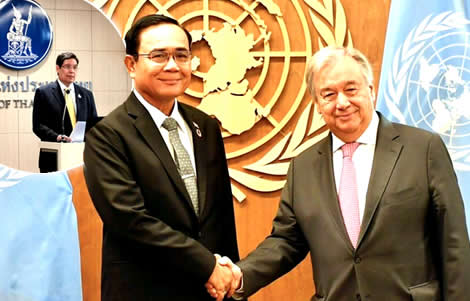Reports from the Bank of Thailand’s Monetary policy committee on Wednesday this week indicated that Thailand’s tourism sector in 2019 is in decline while the Financial Ministry’s Fiscal Policy Unit on Friday indicated that tourist figures are up by 7.4%. The contradiction comes as Thailand pins its hopes on a surge in both tourism and exports to achieve its target of 3% growth this year. The Bank of Thailand has projected a growth rate of 2.8% but all the economic indicators suggest that this figure may also be challenged if the upswing does not come to pass by year’s end.
The Thai prime minister put the best foot forward in New York over the last few days in key speeches and meetings with senior figures such as UN Secretary-General Antonio Guterres. He pledged that Thailand would stand with the US as a friend in the region and that the kingdom would become a high-income society by 2036 with a greater emphasis placed on human rights and inclusion.

It comes while at home in Thailand this week, the economic picture was darkening with what appears to be contradictory information coming from the Bank of Thailand and the Finance Ministry on Thailand’s prized tourist industry.
On Thursday in New York, following a top-level meeting at the 74th Session of the United Nations with the Secretary-General of the UN Antonio Guterres, the Thai prime minister was bullish about Thailand’s prospects in the long term. He predicted that Thailand would become a high income, first-world economy in 17 years or by 2036. ‘Thailand will become a high-income country with fairness, respect for basic human rights, and participation of all sectors of society,’ Prayut Chan-ocha said.
Positive message as PM talks up the kingdom
The positive message was to be expected from a national leader promoting inward investment into Thailand at a number of events including a speech to the Asia Society and US-ASEAN Business Council. The prime minister put the best foot forward to promote friendship and closer relations between Thailand and the United States as well as highlighting investment opportunities for US firms thinking of locating to Thailand.
Strong support for the US Thai relationship
During the week, the prime minister had spoken particularly strongly about the US Thai relationship. In his speech to the Asia Society, a Manhattan-based non-profit organisation that promotes Asian interests in the United States, the prime minister said that Thailand is proud to be a friend and business partner with the United States. ‘I pledge to maintain close ties with the US in this challenging world,’ he said.
PM: last government laid the foundations for economic transformation that is now being pursued
At a number of events, the prime minister promoted Thailand’s 4.0 programme, it’s a commitment to Asia and expanding free trade in the Asia Pacific region to promote economic growth.
At his speech to the US-ASEAN Business Council on Thursday, General Prayut said that his first government had laid the foundations for Thailand’s transformation into a developed economy over the next two decades. He pointed out that he now led a democratically elected ministry and conceded that economic growth had slid back from 4.1% last year to a projected range of 2.7% to 3.2% this year.
Bank of Thailand – growth this year to be 2.8%
At home on Wednesday, the Monetary Policy Committee of the Bank of Thailand chimed with the Prime Minister’s figures when it downgraded the economic growth forecast for the kingdom for the fourth time in a row to 2.8% this year. The committee’s report overall, however, pointed to a far gloomier outlook for the Thai economy.
For a start, the report seems to contradict the Finance Ministry contention on Friday and the Thai Tourism Authority which reports that tourism in Thailand is up this year. The monetary committee of the Bank of Thailand described tourism as a declining sector for 2019.
Committee predicts Thailand’s exports to decline
The committee also conceded that it is likely that Thailand’s exports will decline this year. The question is by how much. Currently, the Fiscal Policy Office of the Finance Ministry suggests that anything more than a 1% contraction would spell the end of the government’s target of 3% growth.
So far, exports are down by 2.2% for the year but officials are hopeful that with a declining base from last year, we may see an export improvement for the last four months of 2019. The briefing this week on Friday was given by Wuttipong Jittungsakul, the deputy director-general of the Fiscal Policy Office.
Ministry briefing showed van sales down by over 9%
Thailand’s economy grew 4.1% last year driven by a 7.7% export surge that faltered towards the end of the period. Overall, the Thai economy is now sending ominous indicators. The briefing by the Ministry of Finance showed commercial van sales are down over 9%. Capital imports also down by a similar margin indicating a fall-off in investment.
Thailand’s imports are down by 3.6% but it’s trade current account has improved due to the increased export of gold to other countries, surely a sign of a roiled world economy. The briefing suggested that tourist figures were up by 7.4% which contradicts the position of the Bank of Thailand’s monetary policy committee saying clearly that the sector was in decline.
Export slowdown has impacted domestic demand
The briefing from the influential committee of the Bank of Thailand was given by its secretary Titanun Mallikamas. He said that the export slowdown has impacted domestic demand. He highlighted a decline in tourism, higher household debt and adjusted the projected growth rate downwards for both public and private investment.
Flooding is a new factor offsetting stimulus measures
Significantly, he also introduced a new factor, that of natural disasters, thought to refer to the recent flooding in 32 provinces as a new deadweight on the kingdom’s economic growth prospects.
He indicated that this factor would have a had a greater impact on the economy’s fortunes were it not for the government economic stimulus measures designed to prime the economy. As things stand, the export contraction has fed into domestic spending and employment levels across the country.
Further reading:
Bank of Thailand governor warns about growing debt levels, calls for sufficiency economic thinking


















